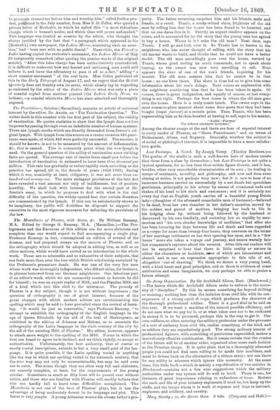On Army Organization. By Sir Archibald Alison, Bart. (Blackwood.) —The
lesson which Sir Archibald Alison seeks to enforce is the neces- sity of " discipline." By this he means something far beyond drilling or training; nothing less than the isolation from civil life, with its con- sequences of a strong esprit de corps, which produces the oharacter of the thorough professional soldier. There is a good deal to be said on this text. If we want a machine of the utmost possible efficiency, and do not care what we pay for it, or at what other cost not to be reckoned in money it is to be procured, perhaps this is the way to get it. Our own soldiers, so often entering the military profession under the pressure of a sort of outlawry from civil life, realize something of the kind, and as soldiers they are superlatively good. The strong military honour of professional fighters, with something of patriotism superadded, makes a marvellously effective combination. But it seems certain that the armies of the future will be of another order, organized after some such fashion as the Prussian troops. It is quite plain that in a thoroughly educated/ people you could not find men willing to be' inade into machines, and must bo driven back on the alternative of a citizen army ; nor can there be any utility in schemes which ignore this necessity. At the same time, this little book—which is mainly a republication of two articles in Blackwood—contains not a few wise suggestions which the military authorities under any system will do well to heed. There is one, for instance, of great importance relating to reductions of force. Reduce the rank and file of your infantry regiments, if need be, but keep up the staffs, and the troops whom it is work of expense and time to instruct, engineers, and artillery, and cavalry.






























 Previous page
Previous page